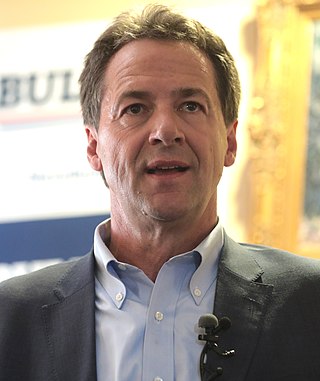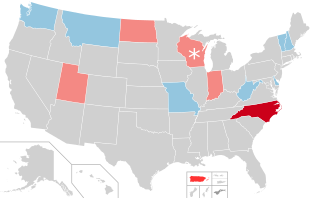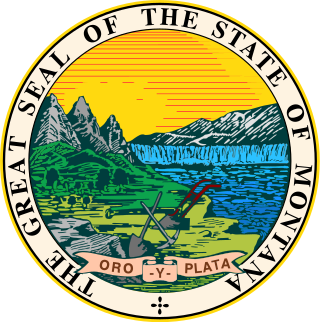Related Research Articles
A write-in candidate is a candidate whose name does not appear on the ballot but seeks election by asking voters to cast a vote for the candidate by physically writing in the person's name on the ballot. Depending on electoral law it may be possible to win an election by winning a sufficient number of such write-in votes, which count equally as if the person were formally listed on the ballot.

From January 3 to June 5, 2012, voters of the Democratic Party chose its nominee for president in the 2012 United States presidential election. President Barack Obama won the Democratic Party nomination by securing more than the required 2,383 delegates on April 3, 2012, after a series of primary elections and caucuses. He was formally nominated by the 2012 Democratic National Convention on September 5, 2012, in Charlotte, North Carolina.

Stephen Clark Bullock is an American politician and lawyer who served as the 24th governor of Montana from 2013 to 2021. He is a member of the Democratic Party.

United States gubernatorial elections were held in 12 states and two territories. Of the eight Democratic and four Republican seats contested, only that of North Carolina changed party hands, giving the Republicans a net gain of one governorship. These elections coincided with the presidential election on November 6, 2012. As of 2024, this marked the last time in which a Democrat won the governorship in Missouri and the last time in which a Republican won the governorship in North Carolina.

The 2014 United States Senate election in Montana took place on November 4, 2014, to elect a member of the United States Senate from Montana, concurrently with other elections to the United States Senate in other states and elections to the United States House of Representatives and various state and local elections.

Kathleen Williams is an American politician from Montana. A member of the Democratic Party, she served in the nonpartisan Environmental Quality Council of the Montana Legislature and the Montana Department of Fish, Wildlife and Parks. In 2010, she was elected to the Montana House of Representatives and served three two-year terms before retiring. In 2018 and 2020, Williams ran, unsuccessfully, as the Democratic nominee for Montana's at-large seat in the United States House of Representatives.

Matthew Martin Rosendale Sr. is an American politician. A Republican, Rosendale represents Montana's 2nd congressional district in the United States House of Representatives. Rosendale served in the Montana House of Representatives from 2011 to 2013, and in the Montana Senate from 2013 to 2017. From 2015 to 2017, he served as Senate majority leader. Rosendale was elected Montana state auditor in 2016 and held that position from 2017 to 2020. Rosendale ran unsuccessfully for the U.S. House of Representatives in 2014 and for the U.S. Senate in 2018. He was elected to represent Montana's at-large congressional district in 2020. After Montana regained its second House seat in the 2020 census, Rosendale was elected to represent the new 2nd congressional district in 2022.
This article contains lists of official and potential third party and independent candidates associated with the 2016 United States presidential election.

The American Solidarity Party (ASP) is a Christian democratic political party in the United States. It was founded in 2011 and officially incorporated in 2016. The party has a Solidarity National Committee (SNC) and has numerous active state and local chapters. Peter Sonski is the party's nominee in the 2024 United States presidential election.

The 2020 United States Senate elections were held on November 3, 2020, with the 33 class 2 seats of the Senate contested in regular elections. Of these, 21 were held by Republicans, and 12 by Democrats. The winners were elected to 6-year terms from January 3, 2021, to January 3, 2027. Two special elections for seats held by Republicans were also held in conjunction with the general elections: one in Arizona, to fill the vacancy created by John McCain's death in 2018; and one in Georgia, following Johnny Isakson's resignation in 2019. These elections ran concurrently with the 2020 United States presidential election in which incumbent president Donald Trump lost to Democratic nominee Joe Biden.

The 2020 United States Senate election in Montana was held on November 3, 2020, to elect a member of the United States Senate to represent the State of Montana. It was held concurrently with the 2020 U.S. presidential election, as well as other elections to the United States Senate in other states, elections to the United States House of Representatives, and various state and local elections. The primaries for both the Democratic and Republican nominations took place on June 2, 2020. Incumbent senator Steve Daines won the Republican primary, while Montana Gov. Steve Bullock won the Democratic primary.

United States gubernatorial elections were held on November 3, 2020, in 11 states and two territories. The previous gubernatorial elections for this group of states took place in 2016, except in New Hampshire and Vermont where governors only serve two-year terms. These two states elected their current governors in 2018. Nine state governors ran for reelection and all nine won, while Democrat Steve Bullock of Montana could not run again due to term limits and Republican Gary Herbert of Utah decided to retire at the end of his term.

The 2020 New Hampshire Democratic presidential primary took place on February 11, 2020, as the second nominating contest in the Democratic Party primaries for the 2020 presidential election, following the Iowa caucuses the week before. The New Hampshire primary was a semi-closed primary, meaning that only Democrats and independents were allowed to vote in this primary. New Hampshire sent 33 delegates to the national convention, of which 24 were pledged delegates allocated on the basis of the results of the primary, and the other 9 were unpledged delegates preselected independently of the primary results.
This article lists third-party and independent candidates, also jointly known as minor candidates, associated with the 2020 United States presidential election.

The 2020 Vermont Democratic presidential primary took place on March 3, 2020, as one of 15 contests scheduled on Super Tuesday in the Democratic Party primaries for the 2020 presidential election, following the South Carolina primary the weekend before. The Vermont primary was an open primary, with the state awarding 24 delegates towards the 2020 Democratic National Convention, of which 16 were pledged delegates allocated on the basis of the results of the primary.
This article contains the results of the 2020 Democratic Party presidential primaries and caucuses, the processes by which the Democratic Party selected delegates to attend the 2020 Democratic National Convention from August 17–20, 2020. The series of primaries, caucuses, and state conventions culminated in the national convention, where the delegates cast their votes to formally select a candidate. A simple majority (1,990) of the total delegate votes (3,979) was required to become the nominee.

This is the electoral history of Michael Bloomberg, billionaire and the 108th Mayor of New York City, in office from 2002 to 2013. He was a late entry to the 2020 Democratic Party presidential primaries, competing only in Super Tuesday and ending his campaign the morning after.

A general election was held in the state of Montana on November 8, 2016, with primaries being held on June 7, 2016. All six executive offices were up for election, as well as the state's U.S. House seat and the state legislature.

An election was held on November 8, 2016, to elect 25 members to Montana's Senate. The election coincided with elections for other offices, including the Presidency, U.S. House of Representatives, Governorship, and state house. The primary election was held on June 7, 2016.

The 2022 Vermont Senate election took place on November 8, 2022, as part of the biennial United States elections. The election coincided with elections for other offices including the U.S. Senate, U.S. House, Governor, and State House. Vermont voters elected all 30 state senators from 16 districts, with each district electing between one and three senators. State senators serve two-year terms in the Vermont Senate. Primary elections were held on August 9, 2022. This election would be the first to use new districts adopted by the Vermont General Assembly to allocate for population changes across the state after the 2020 census.
References
- ↑ "2000 STATEWIDE PRIMARY CANVASS - JUNE 6, 2000" (PDF). Secretary of State of Montana. Secretary of State Mike Cooney. Retrieved March 7, 2020.
- ↑ "2008 STATEWIDE PRIMARY CANVASS - JUNE 3rd, 2008" (PDF). Secretary of State of Montana. Secretary of State Brad Johnson. Retrieved March 7, 2020.
- ↑ "2008 STATEWIDE GENERAL CANVASS - NOVEMBER 4th, 2008" (PDF). Secretary of State of Montana. Secretary of State Brad Johnson. Retrieved March 7, 2020.
- ↑ "2012 STATEWIDE PRIMARY ELECTION CANVASS" (PDF). Secretary of State of Montana. Secretary of State Linda McCulloch. Retrieved March 7, 2020.
- ↑ "2012 STATEWIDE GENERAL ELECTION CANVASS" (PDF). Secretary of State of Montana. Secretary of State Linda McCulloch. Retrieved March 7, 2020.
- ↑ "2016 STATEWIDE PRIMARY ELECTION CANVASS" (PDF). Secretary of State of Montana. Secretary of State Linda McCulloch. Retrieved March 7, 2020.
- ↑ "2016 STATEWIDE GENERAL ELECTION CANVASS" (PDF). Secretary of State of Montana. Secretary of State Linda McCulloch. Retrieved March 7, 2020.
- ↑ "Results: New Hampshire 2020 Presidential Primary - Democratic President". New Hampshire Secretary of State . Retrieved February 13, 2020.
- 1 2 3 4 5 "2020 Presidential Primary - Democratic Write-Ins (last update: 19:06 Feb.13)". New Hampshire Secretary of State . Retrieved February 13, 2020.
- ↑ "Live Results: New Hampshire Primary" . The New York Times. February 11, 2020. Archived from the original on February 14, 2020. Retrieved February 12, 2020.
- ↑ "Arkansas Election Results 2020". PBS NewsHour. Retrieved March 3, 2020.
- ↑ "Montana U.S. Senate Primary Election Results". The New York Times. June 3, 2020. Retrieved June 3, 2020.
- ↑ "Montana Federal Election Results". Montana Secretary of State. November 3, 2020. Retrieved November 18, 2020.
- ↑ Number of pledged delegates towards the 2020 Democratic National Convention. [10]
- ↑ Full results with all 16 minor candidates included available in the main article.
- ↑ Other write-ins (173 votes) does not include Michael Bloomberg (4,777 votes), Donald Trump (1,219 votes) and Bill Weld (16 votes). Total number of all write-ins was 6,185 votes. [9]